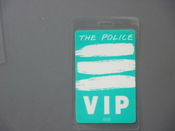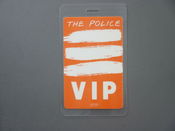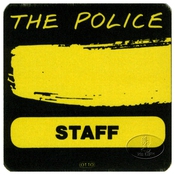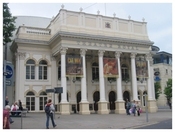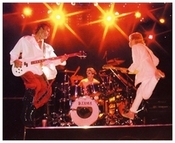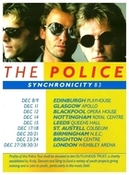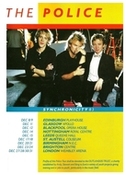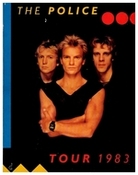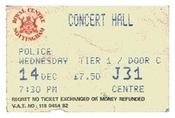
Synchronicity
Dec
14
1983
Nottingham, GB
Royal Centrewith The Belle Stars
The Police in Nottingham...
The Police have managed to reconcile all the apparent contradictions raised by their enormous success: how to be successful and still likeable; make populist music that is also intelligent; temper ambition with integrity; be rich and, in some respects at least, stay hungry.
For the moment at least the Police are probably the most bankable pop group in the world. In America they have been playing regularly in 70,000-seater venues, and it is commendable to see them undertaking a British tour which takes in small provincial theatres where the subtleties, not just the grandeur, of their performance can be better appreciated.
At times during their performance in Nottingham the group showed signs of fatigue - it was been a hectic year - but for the most part they looked the most complete of pop groups - a seductive mixture of glamour, charm and keen musical skill.
Musically, they have advanced under cover. Building on their foundation of scrambled reggae rhythms, they have integrated synthesiser electronics and, more recently, ethnic trappings - clattering percussion, pipes and Sting's jungle cries - in an effortless and uncontrived way.
The occasional inconsistencies in their writing - and there were moments in this performance when interest flagged - are always swiftly redeemed by those marvellous, deceptively simple and naggingly addictive melodies, 'Message In A Bottle'. 'Every Breath You Take', and so on.
The balance within the group is perfect: the propulsion of Stewart Copeland's crisp and uncluttered drumming; the ready melodic phrases and embellishments of Andy Summers' guitar; and Sting's forceful but always warm singing.
They are many reasons to dislike Sting. His cheekbones are perfect. For a moment, as he bounced high in the air on his heels, it seemed as if he might even possess superhuman powers, until one realised he was actually on a small trampoline. And is a millionaire without the consoling decency of looking desperately unhappy.
His songs may dwell on loneliness and alienation, but his trick is not to wallow in it. He is not so much tortured as bearing up philosophically under the strain, and ultimately turning it into a rite of exhilarating rapport with the audience.
As he becomes more sure of his position, and his constituency, he also appears to introduce more political elements in his performance. Chastising Thatcher and Reagan or the deviousness and hypocrisy of politicians may not be exactly revolutionary, but it is heartening to hear - especially in as finely-crafted a metaphor as 'Murder By Numbers' - when most pop music is looking fixedly in the opposite direction.
It always seems as if there should be a glaring paradox in singing about alienation, moral bankruptcy and the spiritual solution from such a secure position - and being sponsored by Guinness, too, as this tour is - but the crowning achievement of the Police is to suggest there need not be.
(c) The Guardian by Mick Brown
The Police in Nottingham...
Once in the lobby, I'm faced with a most cloying mixture of bitter and sweet odours; it's as if all those TV adverts for Denim aftershave and Rive Gauche perfumes, mixed with a wave of Havana cigar smoke, have come to life in the shape of the well-heeled set of glamorous-looking people who make up most of tonight's audience. They prefer measures of Bacardi & Coke to a can of cut-price Guinness (said firm are partly sponsoring the tour).
A warning voice reminds us that ''the concert will continue in five minutes time'' and no sooner are the already-merry patrons in their seats than a nasal voice booms from somewhere near the rear of the stage. Amid some mad scrambling to see the stage, I can just about view (everyone's so tall!) bands of gold, red and blue light flanking the band, adding fire to the atmosphere of giddy excitement. And when a powdery-white spotlight fixes on the centre of attention, Sting, this extracts some thunderous applause and more hushed squeals of delight. It's obvious who they've come here to see tonight.
As the set gains momentum, Sting's call of ''eee-ooh-ho'', ''eee-ayyyy'', ''eee-ahhh-yow'', ''lo-lo-lo'' (and other variations thereof) become more intertwined with each song, and these interludes are worth hearing. Very much so. But at most other times, the band appear to be altogether bored by the whole thing and, somewhat ironically, respond least to the older hits most loved by the audience ('Don't Stand So Close To Me' nearly raises the roof). This isn't helped by their tendency to ignore each other on stage; apart from the odd ''Andy Summers!'' or ''Stewart Copeland!'', Sting really only acknowledges his cohorts on 'So Lonely' when, after a patchy beginning, he grimaces and mutters into the mike ''Oh, nice start...''
I've seen them powerful, majestic, even positively sweeping. But they weren't any of that tonight.
(c) Smash Hits by Linda Duff
Breathing method...
It seemed at first to be just an overactive imagination playing tricks on one's lightshow-dazzled hearing skills, and surely, nothing more; but later, fears were confirmed by other disbelieving ears.
STING PLAYED A BUM NOTE.
Must be true, it's here in print.
Thing is, being an international mega-star, Sting took that painfully duff half-second (or thereabouts) of clumsy musicianship and transformed it into a thing of beauty; 'Tea In The Sahara' smouldered onwards, and no one seemed to have noticed anyway.
The Police began their effortlessly brilliant set with a startling lack of warning - as 'Synchronicity' drifted into the foyer, Police Warriors were still lounging around with their ice creams - and there seemed almost to be an air of wanting to get things over and done with as quickly as possible about their lightning pace, their barely stopping for breath between songs; or maybe it was purely a genuine hunger for new peaks which drove them on. Whatever, it's of little consequence. Nothing can touch The Police these days, why, they're even bigger than Paul Young around these parts.
And isn't it great, at last, to have a mega-group that makes music of a calibre deserving of such fame and fortune (and loneliness). It's wonderful knowing that when, say, 'Message In A Bottle' reaches it's climax, there are countless further treasures to come - for a fun party game, try naming them all - and less pleasantly, plenty further Sting-led crowd singalong yawnalongs: but that's showbiz for ya.
Andy, (fancy white shirt) Stuart (white'n'blue baseball top, numbered '99') and the Other One (frilly leather Pop Star type outfit) are so popular that even the local cap-sleeved yobs join hands and sing along, practically dribbling over the carpet in their eagerness to obey the Other One's every command.
The Police are so talented now as performers, musicians and songwriters, (90 per cent of the time) that when they hit that halfway point in 'Every Breath You Take', where heaven's gates open and the meaning of life generally unfolds, nothing less than a communal wave of ecstasy rushes through the audience, hinting loudly at the involuntary opening of several thousand bowels. The moment is magic. Dead straight.
They play 'So Lonely' and it suddenly clicks how similar Sting's voice (when pushed to its limit) is to that of Mickey Dolenz. Nothing important. The Police show is absolute technical perfection; beautifully presented, beautifully performed.
They encore with 'Roxanne' and one wonders if it takes them back to the boiling intimacy of the Marquee, and if they miss the old days, the nights when they could down a swift pint at the bar and have a bash on the old Space Invaders pre-gig, if they'd like the chance to be able to snap their fingers and be mere mortals all over again. So many questions...
When he's out there in front of all those worshippers, being so famous, playing that historical music, does Sting secretly sometimes wish he were at home with a nice cup of tea watching 'Sportsnight', or having a bath, or wrapping up the Christmas presents?
It's not important, but one gets the distinct impression (or is it merely good showmanship?) that he loves and thrives on that, perhaps everlasting, mega-popular Police Sound, which might just add up to the acceptable face of 80s Pop Capitalism. Not that it matters.
(c) Sounds by Winston Smith
Grabbed By The Fuzz!
There's nothing very ''impenetrable'' about the Police, and still a few things that grate. Sting's pinched roots wail is often little more than a mewling hash of Bono and Jon Anderson (like Bono he goes in for a lot of this ''ey-yo-yo'' nonsense to sound that note of messianic exhortation) and his lonely-man-in-search-of-truth act can be a bit of a drag, too.
How much longer Sting can play this peroxide Man Of Sorrows it will be fascinating to see. I can accept that it you're the biggest white pop-star on earth you're gonna need a little something to get you thru' the night - a toss-up between Jung and cocaine, really but I'm not sure I buy Sting's re-synchronisation of himself wholesale. That said, The Police are in pretty fine fettle.
In performance, the Sting of 'One World' and 'O My God' do not entirely engage me, though the latter almost turns into a soul stomp.
It could just be the Mad Max-goes-New Romantic togs that fail to convince, but the routine of performance has caught up with him. His little-boy-blue antics and gestures towards rock theatre look tired. A forced affability ill-masks the gulf between the man and his audience. He is so very serious a fellow, is he not ?
Tonight's audience does not observe this distance. A younger bunch, from the 'Don't Stand So Close' days, might have sensed it, but Nottingham's smoothly square young adults are here for the Moon's and Da Do's, the chunes they made out to before the first down-payment. They are not here for 'King Of Pain'.
I think Sting knew what he was doing when he sacrificed the U.K. teenybop market, though a tiny, fierce clutch of girls is here tonight. From being a saucy schoolmaster, Sting was suddenly this angelic hunk who wanted to save you brimstone'n'treacle tarts from the pain of false love. So that you should not end up Roxannes, you were required to read ''Modern Man In Search Of A Soul'' and other such hippie paraphernalia. From this angle, Sting is the only romantic still prowling the global video network: hence a mass exodus in the general direction of Duran Duran. Adolescents aren't terribly romantic.
Sting's a little like Bowie in the ways he avoids plunging into the abyss of narcissism. They both get interested in the same things, the same sort of film parts, in order to close up that eternal gap between self and image. (In the old days, it would have been personalised gurus.) The difference between Sting and Bowie is that Sting does appear to have suffered a little. One only hopes he won't Exit the Koestler way.
The music at Nottingham is superb, natch. Three toy-drummer girls in tights fill up the spaces in The Police's marvellously free and fleet-footed songs, from the jazz-funked Yes of Synch I to the macabre, twisted jazz of 'Murder By Numbers'.
Stewart Copeland works his vast panoply of surfaces as though guiding us on a tour (I liked what he told Cook about feeling more of an anthropologist than a participant.) He frequently overdoes things but every little one of them is magic. This one-man dub machine is always beautiful to watch. Andy Summers has a low-key night but there's a gorgeously glassy passage in the middle of 'Tea In The Sahara' where he really comes into his own; 'Walking In Your Footsteps' he laces with flinty, glinting runs that recall the Jerry Garcia of 'China Cat Sunflower'. The lighting is consistently awesome: aquatic neon blues and greens, dry ice billowing through shafts of red and orange like sunset in a rain forest.
For Mr. Sumner, though, there's always a little black (almost invisible) sun up in that spotlight, an ethereal zone where he really is a free spirit and we truly are immaterial. In the classical grace of 'Every Breath You Take' (a ''nasty little song'' that sounds like a hymn to the shades), he crowns himself king of pain once again, and once again gets away with it.
But he has only come here seeking knowledge.
(c) The New Musical Express by Barney Hoskyns
The Police have managed to reconcile all the apparent contradictions raised by their enormous success: how to be successful and still likeable; make populist music that is also intelligent; temper ambition with integrity; be rich and, in some respects at least, stay hungry.
For the moment at least the Police are probably the most bankable pop group in the world. In America they have been playing regularly in 70,000-seater venues, and it is commendable to see them undertaking a British tour which takes in small provincial theatres where the subtleties, not just the grandeur, of their performance can be better appreciated.
At times during their performance in Nottingham the group showed signs of fatigue - it was been a hectic year - but for the most part they looked the most complete of pop groups - a seductive mixture of glamour, charm and keen musical skill.
Musically, they have advanced under cover. Building on their foundation of scrambled reggae rhythms, they have integrated synthesiser electronics and, more recently, ethnic trappings - clattering percussion, pipes and Sting's jungle cries - in an effortless and uncontrived way.
The occasional inconsistencies in their writing - and there were moments in this performance when interest flagged - are always swiftly redeemed by those marvellous, deceptively simple and naggingly addictive melodies, 'Message In A Bottle'. 'Every Breath You Take', and so on.
The balance within the group is perfect: the propulsion of Stewart Copeland's crisp and uncluttered drumming; the ready melodic phrases and embellishments of Andy Summers' guitar; and Sting's forceful but always warm singing.
They are many reasons to dislike Sting. His cheekbones are perfect. For a moment, as he bounced high in the air on his heels, it seemed as if he might even possess superhuman powers, until one realised he was actually on a small trampoline. And is a millionaire without the consoling decency of looking desperately unhappy.
His songs may dwell on loneliness and alienation, but his trick is not to wallow in it. He is not so much tortured as bearing up philosophically under the strain, and ultimately turning it into a rite of exhilarating rapport with the audience.
As he becomes more sure of his position, and his constituency, he also appears to introduce more political elements in his performance. Chastising Thatcher and Reagan or the deviousness and hypocrisy of politicians may not be exactly revolutionary, but it is heartening to hear - especially in as finely-crafted a metaphor as 'Murder By Numbers' - when most pop music is looking fixedly in the opposite direction.
It always seems as if there should be a glaring paradox in singing about alienation, moral bankruptcy and the spiritual solution from such a secure position - and being sponsored by Guinness, too, as this tour is - but the crowning achievement of the Police is to suggest there need not be.
(c) The Guardian by Mick Brown
The Police in Nottingham...
Once in the lobby, I'm faced with a most cloying mixture of bitter and sweet odours; it's as if all those TV adverts for Denim aftershave and Rive Gauche perfumes, mixed with a wave of Havana cigar smoke, have come to life in the shape of the well-heeled set of glamorous-looking people who make up most of tonight's audience. They prefer measures of Bacardi & Coke to a can of cut-price Guinness (said firm are partly sponsoring the tour).
A warning voice reminds us that ''the concert will continue in five minutes time'' and no sooner are the already-merry patrons in their seats than a nasal voice booms from somewhere near the rear of the stage. Amid some mad scrambling to see the stage, I can just about view (everyone's so tall!) bands of gold, red and blue light flanking the band, adding fire to the atmosphere of giddy excitement. And when a powdery-white spotlight fixes on the centre of attention, Sting, this extracts some thunderous applause and more hushed squeals of delight. It's obvious who they've come here to see tonight.
As the set gains momentum, Sting's call of ''eee-ooh-ho'', ''eee-ayyyy'', ''eee-ahhh-yow'', ''lo-lo-lo'' (and other variations thereof) become more intertwined with each song, and these interludes are worth hearing. Very much so. But at most other times, the band appear to be altogether bored by the whole thing and, somewhat ironically, respond least to the older hits most loved by the audience ('Don't Stand So Close To Me' nearly raises the roof). This isn't helped by their tendency to ignore each other on stage; apart from the odd ''Andy Summers!'' or ''Stewart Copeland!'', Sting really only acknowledges his cohorts on 'So Lonely' when, after a patchy beginning, he grimaces and mutters into the mike ''Oh, nice start...''
I've seen them powerful, majestic, even positively sweeping. But they weren't any of that tonight.
(c) Smash Hits by Linda Duff
Breathing method...
It seemed at first to be just an overactive imagination playing tricks on one's lightshow-dazzled hearing skills, and surely, nothing more; but later, fears were confirmed by other disbelieving ears.
STING PLAYED A BUM NOTE.
Must be true, it's here in print.
Thing is, being an international mega-star, Sting took that painfully duff half-second (or thereabouts) of clumsy musicianship and transformed it into a thing of beauty; 'Tea In The Sahara' smouldered onwards, and no one seemed to have noticed anyway.
The Police began their effortlessly brilliant set with a startling lack of warning - as 'Synchronicity' drifted into the foyer, Police Warriors were still lounging around with their ice creams - and there seemed almost to be an air of wanting to get things over and done with as quickly as possible about their lightning pace, their barely stopping for breath between songs; or maybe it was purely a genuine hunger for new peaks which drove them on. Whatever, it's of little consequence. Nothing can touch The Police these days, why, they're even bigger than Paul Young around these parts.
And isn't it great, at last, to have a mega-group that makes music of a calibre deserving of such fame and fortune (and loneliness). It's wonderful knowing that when, say, 'Message In A Bottle' reaches it's climax, there are countless further treasures to come - for a fun party game, try naming them all - and less pleasantly, plenty further Sting-led crowd singalong yawnalongs: but that's showbiz for ya.
Andy, (fancy white shirt) Stuart (white'n'blue baseball top, numbered '99') and the Other One (frilly leather Pop Star type outfit) are so popular that even the local cap-sleeved yobs join hands and sing along, practically dribbling over the carpet in their eagerness to obey the Other One's every command.
The Police are so talented now as performers, musicians and songwriters, (90 per cent of the time) that when they hit that halfway point in 'Every Breath You Take', where heaven's gates open and the meaning of life generally unfolds, nothing less than a communal wave of ecstasy rushes through the audience, hinting loudly at the involuntary opening of several thousand bowels. The moment is magic. Dead straight.
They play 'So Lonely' and it suddenly clicks how similar Sting's voice (when pushed to its limit) is to that of Mickey Dolenz. Nothing important. The Police show is absolute technical perfection; beautifully presented, beautifully performed.
They encore with 'Roxanne' and one wonders if it takes them back to the boiling intimacy of the Marquee, and if they miss the old days, the nights when they could down a swift pint at the bar and have a bash on the old Space Invaders pre-gig, if they'd like the chance to be able to snap their fingers and be mere mortals all over again. So many questions...
When he's out there in front of all those worshippers, being so famous, playing that historical music, does Sting secretly sometimes wish he were at home with a nice cup of tea watching 'Sportsnight', or having a bath, or wrapping up the Christmas presents?
It's not important, but one gets the distinct impression (or is it merely good showmanship?) that he loves and thrives on that, perhaps everlasting, mega-popular Police Sound, which might just add up to the acceptable face of 80s Pop Capitalism. Not that it matters.
(c) Sounds by Winston Smith
Grabbed By The Fuzz!
There's nothing very ''impenetrable'' about the Police, and still a few things that grate. Sting's pinched roots wail is often little more than a mewling hash of Bono and Jon Anderson (like Bono he goes in for a lot of this ''ey-yo-yo'' nonsense to sound that note of messianic exhortation) and his lonely-man-in-search-of-truth act can be a bit of a drag, too.
How much longer Sting can play this peroxide Man Of Sorrows it will be fascinating to see. I can accept that it you're the biggest white pop-star on earth you're gonna need a little something to get you thru' the night - a toss-up between Jung and cocaine, really but I'm not sure I buy Sting's re-synchronisation of himself wholesale. That said, The Police are in pretty fine fettle.
In performance, the Sting of 'One World' and 'O My God' do not entirely engage me, though the latter almost turns into a soul stomp.
It could just be the Mad Max-goes-New Romantic togs that fail to convince, but the routine of performance has caught up with him. His little-boy-blue antics and gestures towards rock theatre look tired. A forced affability ill-masks the gulf between the man and his audience. He is so very serious a fellow, is he not ?
Tonight's audience does not observe this distance. A younger bunch, from the 'Don't Stand So Close' days, might have sensed it, but Nottingham's smoothly square young adults are here for the Moon's and Da Do's, the chunes they made out to before the first down-payment. They are not here for 'King Of Pain'.
I think Sting knew what he was doing when he sacrificed the U.K. teenybop market, though a tiny, fierce clutch of girls is here tonight. From being a saucy schoolmaster, Sting was suddenly this angelic hunk who wanted to save you brimstone'n'treacle tarts from the pain of false love. So that you should not end up Roxannes, you were required to read ''Modern Man In Search Of A Soul'' and other such hippie paraphernalia. From this angle, Sting is the only romantic still prowling the global video network: hence a mass exodus in the general direction of Duran Duran. Adolescents aren't terribly romantic.
Sting's a little like Bowie in the ways he avoids plunging into the abyss of narcissism. They both get interested in the same things, the same sort of film parts, in order to close up that eternal gap between self and image. (In the old days, it would have been personalised gurus.) The difference between Sting and Bowie is that Sting does appear to have suffered a little. One only hopes he won't Exit the Koestler way.
The music at Nottingham is superb, natch. Three toy-drummer girls in tights fill up the spaces in The Police's marvellously free and fleet-footed songs, from the jazz-funked Yes of Synch I to the macabre, twisted jazz of 'Murder By Numbers'.
Stewart Copeland works his vast panoply of surfaces as though guiding us on a tour (I liked what he told Cook about feeling more of an anthropologist than a participant.) He frequently overdoes things but every little one of them is magic. This one-man dub machine is always beautiful to watch. Andy Summers has a low-key night but there's a gorgeously glassy passage in the middle of 'Tea In The Sahara' where he really comes into his own; 'Walking In Your Footsteps' he laces with flinty, glinting runs that recall the Jerry Garcia of 'China Cat Sunflower'. The lighting is consistently awesome: aquatic neon blues and greens, dry ice billowing through shafts of red and orange like sunset in a rain forest.
For Mr. Sumner, though, there's always a little black (almost invisible) sun up in that spotlight, an ethereal zone where he really is a free spirit and we truly are immaterial. In the classical grace of 'Every Breath You Take' (a ''nasty little song'' that sounds like a hymn to the shades), he crowns himself king of pain once again, and once again gets away with it.
But he has only come here seeking knowledge.
(c) The New Musical Express by Barney Hoskyns

